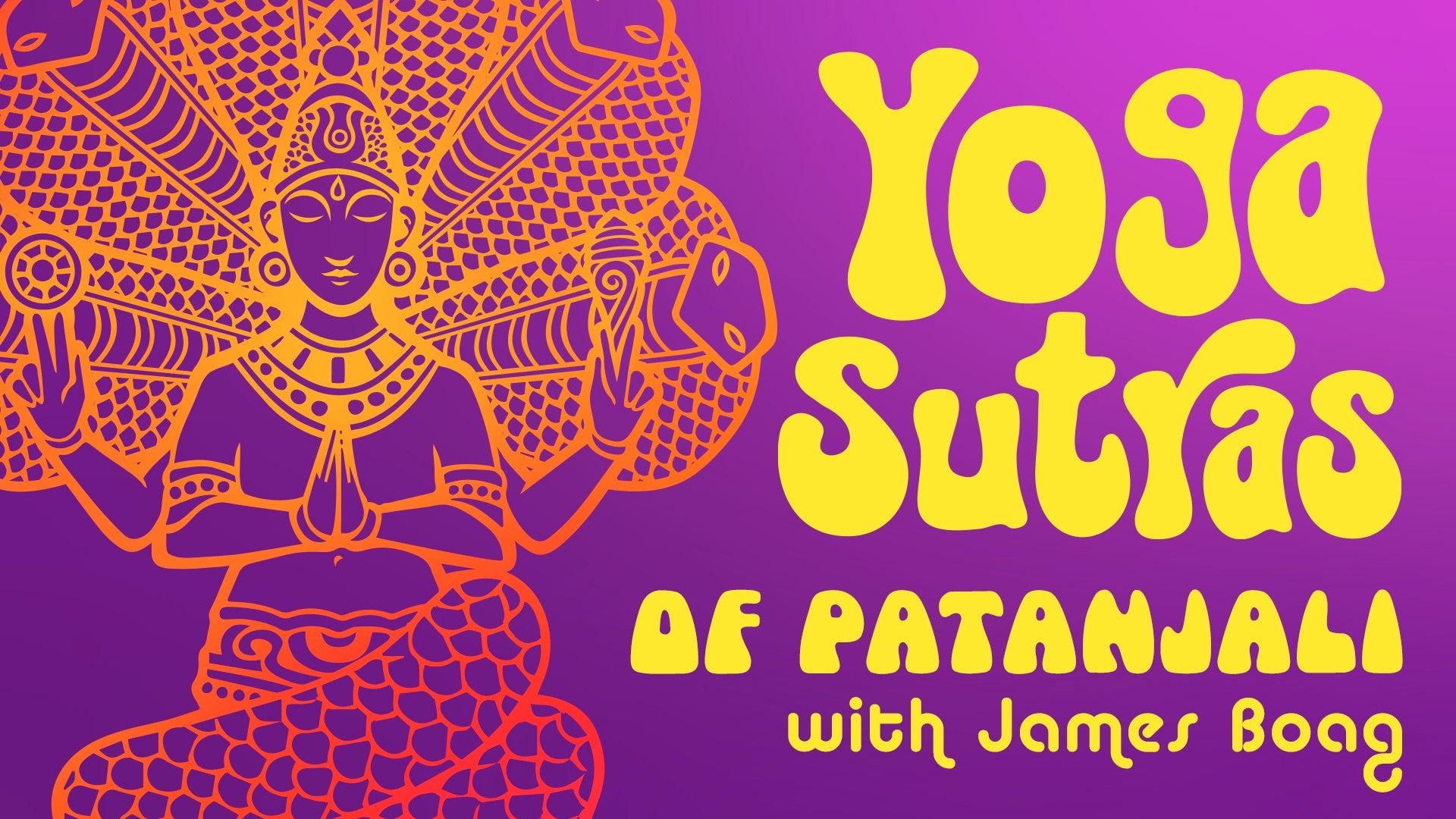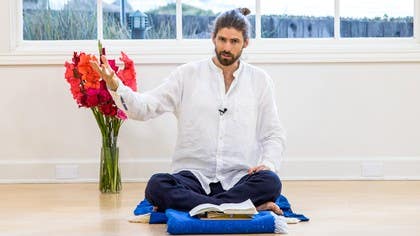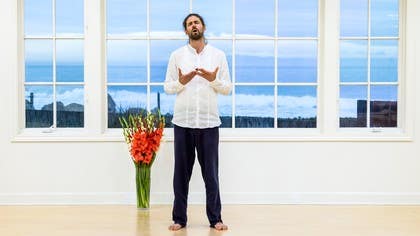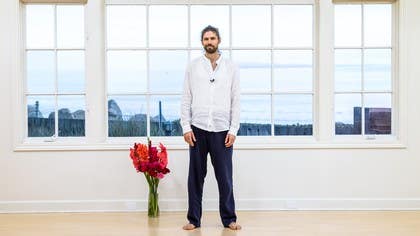Description
About This Video
Transcript
Read Full Transcript
So, Ishwara, the Supreme, is consciousness beyond and without limitations. It cannot be denoted. There is no name for this. It is something beyond representation. We can connote it with the mantra om, which means everything.
And when we start practicing the recognition of the divinity that's all around, it's like we allow ourselves to experience it more and more regularly, more and more readily. We familiarize ourselves with that beauty and wonder that is there in each fresh unfolding moment. What is the consequence of that? Potentially continues in the 29th sutra, tatha hav, katyak che tana adhika mo pyantara aaya abhavish che. So tatha hav, then.
Then what happens? If you do repeat this understanding, this notion of everything being divine, if you start to go to see God in everything, then what happens? Tatha hav, katyak che tana adhika maha. So adhika maha basically means understanding. Now, there are different ways to say understanding in Sanskrit.
This includes the verb root gam, which means to go. So adhika maha basically means you get to a state, you approach a state. So then when you practice that notion, you approach the understanding of the essential form of your individual consciousness, pratyak che tana, antaraya abhavah che. And there is the abhavah, the absence, the non-coming up, the non-coming into existence, the absence of antaraya of things that stand in your way, of things that get in the way of you recognizing all that you really are. In other words, there is the absence of obstacles.
So when you practice like this, when you do what is just said in the 28th sutra, tad japas tad artha bhavanam, by repeatedly reminding oneself of the notion of the divinity that is all around and is in everything, then you approach understanding of your own individual consciousness. So what's the idea here? One of the ways that I see it is that basically he's saying, once you start to see divinity all around, in other words, once you start to see the conscious essence all around, so you look at nature and you see so much transformation, so much transformative power. There is consciousness. You look at the plants that grow towards the sun.
You look at the way that animals live in harmony with their surroundings. So much intelligence all around. And so much intelligence happening at the cellular level of our own physical body. So much intelligence to do the simplest daily task, like climb a flight of stairs, like open a draw. So much intelligence to allow us to have sensory experiences.
You start to see and experience and kind of relish this divine capacity to experience through consciousness that is all around. When that happens, then you start to recognize, understand that you're only experiencing anything because you too are conscious. So this idea that we are a spark of the divine, it starts to feel not like a fairy tale, but actually very palpable because I'm having experiences. How? Only because I am conscious.
Transformation is occurring. Maybe you've had a meal recently. What did you do with that meal? You put it into your mouth and then you started transforming it into all sorts of different things. Now if, for example, I was to set myself up in the public square or the high street and I was to stand there, so I'm from the UK and there is quite a lot of street performance in London, for example, and many other UK towns and cities.
So I was to set myself up in the high street and I take in my hand a bowl, let's say, of rice and other food items, and then I was to just look at the bowl of food and transform it into blood and plasma and bone marrow and muscle tissue and adenosine triphosphate and all these other things. What would people say? They'd probably say it's a miracle. But when we stop and explore it and really pay attention to it, we are all miraculous beings. We are all experiencing and being this transformation, this creative, this recreational power all the time.
The idea is when we start to tune into it, when we start to allow ourselves to open up to it, then we can start to appreciate more the divine quality that is also present in our essence and obstacles become absent. So what does that mean? I think one way we can understand it is that when you see everything as divine, where's the obstacle? It's all part of that one great experience. And so when you have an attitude which recognizes that everything is an opportunity to learn, everything is an opportunity to get to know myself a little bit more thoroughly, then what could previously perhaps have seemed like an obstacle is rendered in a different way and is perhaps transformed into an opportunity for growth and deepening awareness.
And so again, very practically, Patani doesn't say, just go around repeating the notion that everything is divine and the world suddenly changes. The world will continue to do what it does. I was at an event recently and someone who I consider a bit of an elder, he said, the universe is unfolding just as it needs to. And many people have said this over the millennia, and it can sometimes be a troubling idea. But I think what can be helped is when we have the attitude or the way of looking out that allows us to remember that there is always so much more happening than that which we can see, it can help us be much more relaxed with what we're experiencing.
And when we're relaxed, we have more space, and in that greater spaciousness, then we can enjoy things more, we can learn more quickly when we grant ourselves that spaciousness. One method that I'm particularly fond of to kind of remind myself of this, a few years ago I had some opportunity to teach in the beautiful golden city of Prague. And Prague, the Czech word, is very interesting, praha. It means threshold or crossing point. And this is a very yogic word, you might say, because yoga happens at the junction.
The place where different forces meet and come into balance, and the place where you can cross from one state of understanding into a new one. The idea being that when we allow ourselves to meet a situation which would previously perhaps have derailed us or overwhelmed us, and we meet it steadily, then we cross into a new way of understanding ourselves. We cross a praha, a threshold, we cross a Prague, you might say. But Prague, P, presence. When we get really present, then we can notice those miracles that are happening and appreciate them all the more readily.
Sometimes it's so easy to just let the miraculous pass us by. But if we do the tremendously courageous thing in our modern world of granting ourselves space and time to stop and look and soak in the wonder of nature all around, wherever we find ourselves, then what happens? When we grant ourselves that space, we allow ourselves to be very, very present. We become more receptive. We can notice more.
Our awareness expands, so P, R, A, presence, receptivity, awareness. And that invites G, gratitude. When we feel grateful, how else do we feel? It's usually accompanied by a feeling of happiness and contentment. And when we feel happy and content, it's easy to feel a bit more confident.
And this is very helpful, because when we feel confident and grounded and we're alert, it's much less easy to manipulate us. It's much less easy for us to be taken advantage of. And so this idea, I think, illustrates some of those principles that Patanji has already spoken about. Yes, you need to be courageous. You need to be valiant.
But when you do practice showing up and you do that heroic thing, the world may be encouraging you to rush along. I know many people who say things like, oh, it's like I'm on a treadmill. I'm in the rat race. It's not uncommon for people to say things or feel things like this these days. And because our society is so often, in so many different ways, encouraging us to be busy, busy, busy, and because busyness is the norm, it takes that heroic stance.
It takes that courage to actually allow yourself space and time to check in and ask yourself, what's really going on here? What do I really want in my life? Am I actually doing what I can, realistically, in the grounded reality of my life to allow myself to experience it in the way that I would like to? Am I drinking as deep from the cup of life as I would like to? And this requires stopping.
So this idea of the repetition, the notion, the divinity, and all, to me, again, this is building what Patanja has already told us, is we have to have the courage, the patience, and the discipline, we might say, to grant ourselves permission to actually slow down to a tempo that might be slower than that which we've been accustomed to or which the surroundings may be, let's say, conspiring to obituate us to. So this is why you need to be a bit of a rebel and a hero to practice yoga, because sometimes you will have to allow yourself more space and time than others might say, or than you might think others might say is appropriate. One of my friends who's also a yoga teacher, she says this is the problem is that we don't grant ourselves permission to look after ourselves. You may have heard this word retreat, to go on retreat. For me, one of the main ideas about retreat is that we stop.
We move out of our routine, and in that different setting, we can remind ourselves what it actually means to treat ourselves well. We can remind ourselves how much space and time is required to actually tune in, to actually calibrate the system, and set ourselves up to be able to navigate the days more easily. And it doesn't mean that we can't have a very full and active life, but as one of my friends said, if you don't have time to meditate one hour a day, meditate two hours a day. The idea being when you stop and gather, when you give yourself permission to just pause and tune in and bring all of these different parts of the instrument, all these different instruments of your being into cohesion, then it's easier to operate in a way which makes it seem like obstacles are not present, because you'll navigate them much more fluently. But, potentially as mentioned here, these obstacles, and he's not mentioned them before, so by this point, you might be able to guess what's coming next.
Often when, potentially, he introduces a new concept, happened with Ishwa, he mentioned Ishwa, and then he defined it. Now he's mentioned obstacles, so he's told us, by the repetition of the notion of the divinity and everything, by practicing that, practically, by granting ourselves permission to see the wonder in the everyday, then we can come to understand that, and then obstacles will fall away. Obstacles, what are they? And that's where he will continue next in the 30th Sutra.
Yoga Sutras of Patanjali: Yoga and the Supreme
Comments

You need to be a subscriber to post a comment.
Please Log In or Create an Account to start your free trial.








